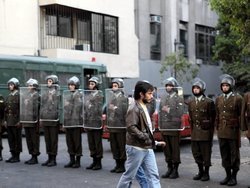The World Cinema Series, a passion project of history professor Thomas Pearson, Ph.D., celebrates its fifth year at the University this semester.
The theme of this year’s films is “Thirty Years After the Fall of the Berlin Wall (1989-2019): Hopes Abandoned,” and seeks to invoke discussion about the influence of democracy, or lack thereof, on international events.
Pearson began featuring films in 2008 with the start of his Provost Series, which continued until he stepped down from the position in 2014.
Since its genesis, the series has undergone an immense growth. Pearson commented that he now has about 15 board members who work to determine the theme, pick films, and ensure that each event runs smoothly.
Each year, the movies center on a certain theme that encourages discussion about worldly topics.
After each movie, Pearson brings in a commentator who will lead discussion and answer questions about the film.
Pearson believes that this aspect is the most valuable of the series. “You get caught up in the story, but the film is actually chosen to focus on a particular theme, and intended to get the audience to think and ask questions,” he said.
 When asked about his primary goal in continuing this series, Pearson stated, “students that go to these films are going to discover that there is a whole world of film out there that is not shown at the blockbuster movie theaters.”
When asked about his primary goal in continuing this series, Pearson stated, “students that go to these films are going to discover that there is a whole world of film out there that is not shown at the blockbuster movie theaters.”
Pearson continually emphasized the importance of global perspective to young people, and that these films seek to encourage students at the University to, “begin to look at events in the world, to look at other people outside their own experiences and to appreciate their lives and perspectives on global issues.”
Pearson seemed delighted that last year’s attendance to the films was much greater than that of previous years, and he is hopeful that this trend will continue.
Students who attend the films note that they are often surprised by the amount of insight that they gain from watching the movies.
Brooke Kampf, a sophomore psychology student, said, “The film I saw gave me more insight into American life from different cultures’ perspectives. It opened my eyes in a way I wasn’t expecting it to.”
Catilin Clarke, a sophomore English education student agreed, and said, “I see people of other cultures and in other countries in a different way now. They’re not strangers, they’re just people.”
This year’s films are a group of diverse genres that all relate to the issue of democracy and restriction on speech, which Pearson thinks, “could not be more fitting” given the current international and political climate.”
Shown on Oct. 8, NO focuses on a marketing executive’s advertisement campaign during the 1988 referendum on Chilean Dictator Augusto Pinochet.
The second flick on Jan. 23, Goodbye Lenin, is a comedy featuring a son who attempts to convince his mother after she awakes from a coma that communist forces are still in power in East Germany.
Feb. 19’s 12:08 East of Bucharest is the third movie that questions the true nature of revolution by following a group of men who aim to reveal if a revolution truly occurred in their town.
The Wave, the fourth film to be shown on Mar. 27, centers around a teacher whose lesson plan on anarchy and dictatorship takes on a life of its own.
The final feature to be screened on Apr. 23, The Nile Hilton Incident, follows the story of a policeman and his navigation of corruption among important officials.
Each movie screening will be held at 7:30 p.m. in Pollak Theater.
On Dec. 13, there will also be a special feature screening.
Pearson says that the advisory committee is always looking for student interest when picking their movies, and anyone interested in the series is welcome to reach out to make suggestions.
PHOTO COURTESY of Thomas Pearson
IMAGE TAKEN from the BFI



